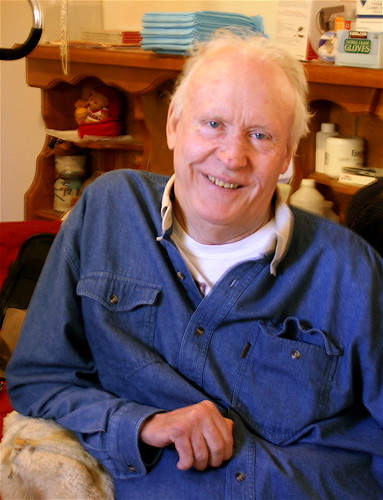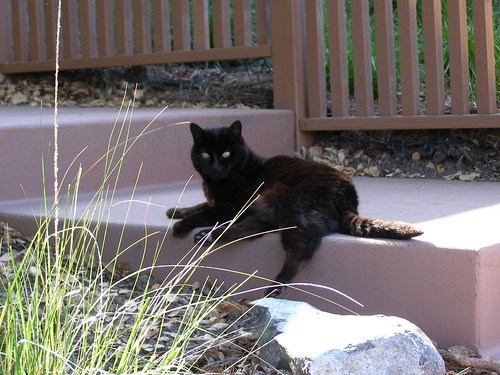I thought to do something different: bury Kenn not praise him. I think he would have liked that “ he liked things that annoyed most people, like that trancey music and spelling his name with 2 Ns. Being the world’s biggest expert. Forgetting things “ like 10 bucks. Being the vegetarian that can’t eat tofu.
But you could not stay angry at Kenn. I mean look at us – Here we are.
So I am just going to stick to my role.
Judy has spoken about Kenn’s professional life, Steve about Kenn as a friend and lover.
I’m here to talk about the Kenn that I knew, which was in some ways his most shockingly unexpected persona, that of the wholesome family man.
We three are not the complete experts on Kenn, but we’re giving briefing notes in the phases of his life. At the reception there will be more stories and hopefully lots of interaction. There’s so much I don’t know about Kenn as an artist, or art collector, just as some of you may want his recipe for broiled eggplant.
Kenn Law met Sharon Goddu (as she then was) in 1975. He’d have been about 21 years old. He’d returned to the Lower Mainland after some years as a hippie camp director and schoolteacher in Lund, BC, and was applying for a job as a child care worker. Sharon, one of the CCWs, objected to his hiring “ she said that there was something kind of intimidating about his charisma and energy “ she knew that he could change her life.
Well, he did get hired, so Kenn and Sharon became coworkers, then friends, best friends, roommates, and ultimately co-parents to her two young daughters, Rachel and Willow.
Ultimately, Sharon moved her family up to Desolation Sound, north of Powell River. Kenn told me he blamed himself for making the Sunshine Coast seem so alluring that he’s sent his precious daughters into a pre-technological world of cold water, oyster digging, and bear evasion.
Later, the girls came of age and started to attend Simon Fraser University. This is where I came into the picture.
Rachel and I worked on the student newspaper together, starting around 1987. She was very friendly and nice, and invited a bunch of us to a party at her place, an old house in Burnaby they called the Pender Palace. And Rachel introduced me to Kenn.
He made a striking impression: tall, broad shoulders, with the shaved head and a menacing expression. I also remember that he was incredibly curt with me. It could be that he was angry about the music “ there was this sloppy jam band playing, I believe they were called the Gonch Messiahs “ we know that he was particular about music.
But I also think he really didn’t like me. He was still reserved years later when I was dating Willow. Now that I am a dad, I really respect his frostiness towards whippersnappers who were hanging around his daughters. I don’t believe he really trusted my intentions until 1995, when we got married. And of course he did all these super-elaborate flower arrangements for the reception.
After that, he was a wonderful father in law and grandpa. He’d come over and cook us big meals, accompany us to shows, coo over the babies when they came, bring us coffee in the morning when we were up all night with a newborn, buy them clothes, volunteer at their school. I’m glad that Sophie and Flynn are almost 6 and 9. They will keep real memories of their Poppa Kenn.
As for Willow and myself, Kenn’s still a real presence in our lives.
This morning, I woke up, looked in the mirror upon which he’d written Go Beyond and Choose Happy in phosphorescent paint, see the tattoos he’d cajoled me into getting together, walk past the kids’ room he decorated, went to the kitchen he painted, ate bacon from the frying pan he left here, drank coffee from one of his mugs, put on the shirt and shoes he gave me, and walked to our car through the garden he planted, from the house he helped me paint.
I know what I’m supposed to feel about that. I ought to be taking consolation from the gifts he’d given us, to feel grateful that we got to know him for a considerable portion of his life. To acknowledge that his life was lived more intensely, passionately, dangerously, creatively than the theoretical average person for whom one day is much like another.
But that math doesn’t make sense to me. Heightened ability to give and to feel should have earned a reward. Those who don’t waste life, should get more years, not less.
I guess I am starting to come out of my shellshock over his quite horrible and protracted death, and into realizing that I am without my friend. He loved gossip, furor, huge emotional scenes. If anyone should be here, with us, it would be Kenn.
And if you’re a religious person, maybe you think he is here. If so, I envy your consolation. For myself, I say, Kenn “ forget the ten bucks. I’ll always owe you. Goodbye.





















